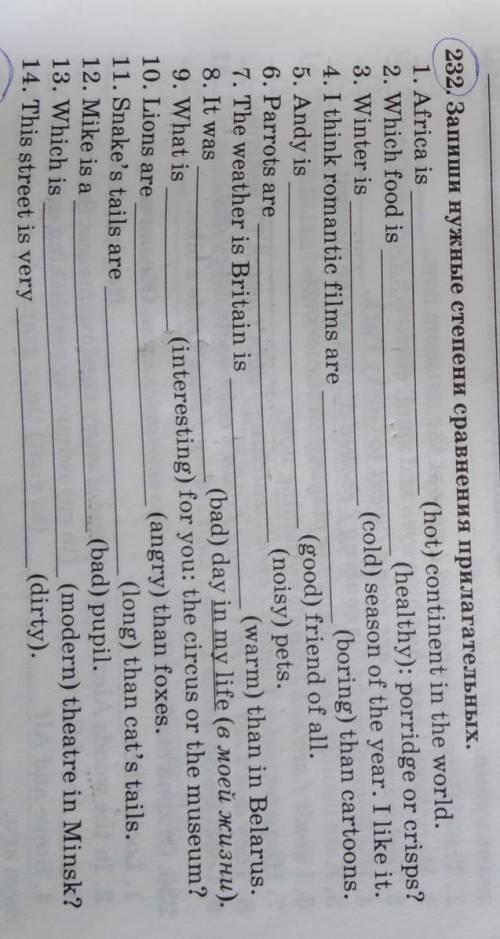
ответ:1)the hottest
2)more healthy
3)the coldest
4)more boring
5)the best
6)the noisiest
7)warmer
8)the worst
9)more interesting
10)angrier
11)longer
12)the worst
13)the most modern
14)dirtier
Правило: если слово короткое, то в сравнительной степени в конце ставишь просто суффикс -er-(warmer) если на конце буква "y", то y меняется на i (noisier). В превосходной степени в конце приписываешь суффикс -est-(hottest), НО ещё перед словом пишешь слово "the". В длинных же словах чуть по другому, мы теперь не добавляем к слову суффиксы, а пишем перед ним в сравнительной степени пишем слово "more", в превосходной степени "most" и про "the" не забываем. Почему не суффикс? А потому что слово и так длинное, зачем себе ещё язык ломать? Легче сказать more beautiful, чем ломая язык сказать beautifuler.
Запомни! Есть таких 2 основных неприятных слов исключений как good(хорошо) и bad(плохо). Казалось бы всё понятно. good-gooder-the goodest, bad-bader-the badest. Но нет! Тогда, может good-more good-the most good, bad-more bad-the most bad. И так тоже НЕТ! Вот как надо: good-better-the best, bad-worse-the worst. Их конечно больше, но это основные.
Я надеюсь, что Вам разобраться с этой несложной темой. Удачи!
task 1
Russia is the largest country in the world but at the same time its population is smaller than in some other countries, China for example. Our country stretches from the Baltic Sea to the Pacific Ocean. There it borders with China and Japan. The largest river in Russia is the Volga. It flows from the Caspian Sea. A lot of old Russians cities lie on it. The chain from mountains to the Pacific Coast are not very high. Russia is one of the greatest countries of the world and we are proud of it.
1. the hottest
2. healthier
3. the coldest
4. more boring
5. good
6. the noisiest
7. warmer
8. worst
9. more interesting
10. angrier
11. longer
12. bad
13. the modest
14. dirty